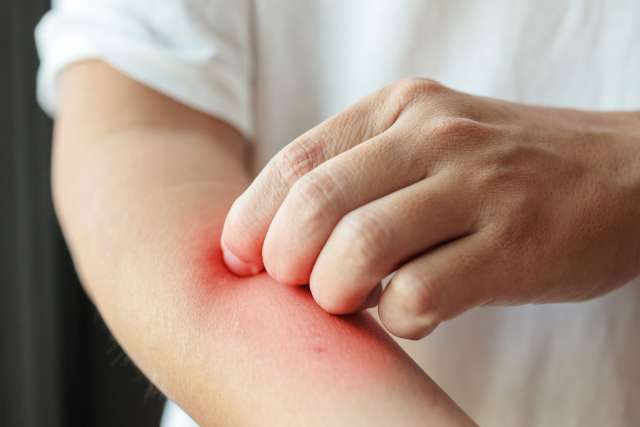Dear Doctors: My wife has a condition where any disruption to her skin, like a bug bite, a scratch or exposure to poison ivy, results in a rash that spreads over half of her body. It’s not related to allergy, and no one has any answers. I’d appreciate any recommendations you can provide.
Dear Reader: A common starting point when discussing skin disruptions is dermatitis, which is an umbrella term that refers to rashes and other forms of skin irritation. Whenever a medical term includes “-itis,” it indicates the presence of inflammation. The prefix “derm,” which derives from the Greek word for skin, names the site of that inflammation.
Dermatitis can arise from a wide range of causes. These include contact with a chemical irritant or an allergen, stress, viral or bacterial infection, immune response and genetics. Common symptoms include itching; burning or prickling sensations; rash; raised bumps or welts; red, dry or flaky skin; and swelling. The condition, which can range from mild to severe, is typically not a threat to one's general health. However, as anyone who has endured the relentless itch of a skin reaction knows, dermatitis can adversely affect quality of life.
Given the circumstances in your wife’s case, it may be useful for you to explore a somewhat rare subset of skin disruptions. These are triggered not by a chemical or an allergen, but by trauma to the skin. This is known as post-traumatic eczema, and sometimes goes by the more general term of post-traumatic dermatitis. These types of skin disruptions arise in response to some form of injury. The cause can range from something seemingly minor, such as a scratch or a scrape or the puncture from an injection, to a more severe injury, such as a cut or surgical incision.
For some people, sustained pressure on the skin can lead to an inflammatory response. This is a condition known as pressure urticaria, more commonly known as hives. For those who are unfamiliar, hives are red, often itchy bumps on the skin. When someone has pressure urticaria, triggers such as a tight belt or tight pants, the weight of a bracelet, the pressure from kneeling on a hard surface or sitting too long can elicit a rashlike response. The rash can remain localized, or it may spread beyond the region that was subjected to pressure.
Unfortunately, these types of skin disruptions are not well understood. Some researchers believe that a glitch in the immune system plays a role in post-traumatic dermatitis, where the body misinterprets the metabolic signals delivered at the site of the wound and overreacts to them. There is also mounting evidence that links many inflammatory skin conditions to gut health. The gut, as we are learning, plays an important role in immune system regulation.
If you have not yet consulted with a dermatologist, it would be advisable to do so. Someone with a specialty in eczema is likely to be familiar with these conditions and may be able to offer your wife guidance and relief.
(Send your questions to askthedoctors@mednet.ucla.edu, or write: Ask the Doctors, c/o UCLA Health Sciences Media Relations, 10960 Wilshire Blvd., Suite 1955, Los Angeles, CA, 90024. Owing to the volume of mail, personal replies cannot be provided.)





